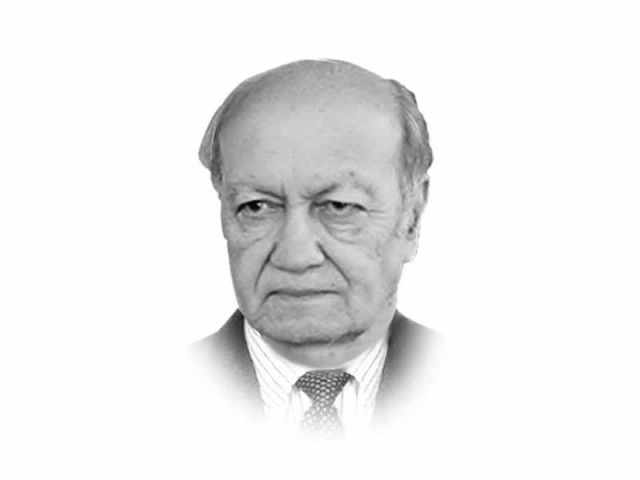Managing a difficult relationship
In the longer term, interests of both countries are best served by normalising the relationship, not by rupturing it

Prime Minister Nawaz Sharif’s policy of beginning a new chapter with India has fallen by the wayside. Foreign secretary-level talks were called off on the flimsy ground that the Pakistan High Commissioner to India invited the Hurriyat leaders for a meeting. Knowing full well that the Pakistani High Commissioner has been meeting Kashmiri representatives for years to hear their point of view, and symbolically to demonstrate that the Pakistan government and people empathise with them, this was something that was completely uncalled for. But in the ‘new India’ under Modi, rules of the game do not allow such contact and this is considered an unfriendly act. The matter does not end here because the broader picture that emerges due to India’s intransigence towards Pakistan is fairly complex and gloomy.
India is not willing to talk on Jammu and Kashmir, Siachen, Sir Creek and issues related to nuclear and strategic stability or sharing of waters. The entire composite dialogue, according to India, can wait and will be dealt unilaterally. On terrorism, India voices its concern, but more to demonise Pakistan than to cooperate in fighting a common enemy. A recent example is the public denunciation of Pakistan’s behaviour that it is supporting terrorism and that Dawood Ibrahim has been provided sanctuary close to the Pakistan-Afghanistan border. For dealing with these allegations, a more appropriate course will be to raise the matter at the government level rather than raising it in public and vitiating the political atmosphere. On nuclear and strategic matters, New Delhi’s stance has been that it can deal with Pakistan at the conventional level and its real threat is from China and engaging on matters of strategic stability with Pakistan is of low priority. India is likely to maintain pressure on Pakistan by maligning it at every international and national forum.
India, however, has its list of genuine grievances that Pakistan needs to address. Islamabad continues to deny India the MFN status because the security establishment would not agree with such a measure, only reinforcing the impression that it is the final arbitrator. The Jamaatud Dawa brazenly keeps flaunting its presence whilst New Delhi waits for an outcome on the Mumbai incident and the Pakistani courts keep dragging their feet.
Pakistan-India relations have gone through much worse scenarios and have a history of three wars and several major skirmishes, but the implications of the current tension, accompanied with frequent ceasefire violations on the Line of Control and the Working Boundary, have a different connotation. Let alone shattering the vision of a peaceful, prosperous and cooperative relationship that Nawaz Sharif had visualised, it is turning out to be a relationship that is designed by Hindu nationalism and is somewhat of a dream for those in the Pakistani establishment, who always mistrusted India and wished it to be classified as an infinite adversary.
Is Modi determined to inflict pain on Pakistan to the extent diplomatically and politically possible for it to change its behaviour? No doubt, Pakistan’s diplomatic leverage has weakened due to its chaotic internal situation, but still, a country of more than 180 million people, nuclear-armed, and strategically located with some reliable and powerful friends, cannot be pushed around. In any case, Pakistan is moving from a transition to a transformation phase, wherein realising the dangers that militancy is taking deep roots, and so is waging an all-out military offensive against the TTP and their affiliates. This has also been clearly spelt out in the speech that General Raheel Sharif made during his recent visit to the US that Operation Zarb-e-Azb is not merely confined to North Waziristan, but is much wider in scope and covers the entire country. And apart from its military dimension, it is “a concept to defeat terrorism in all its forms and manifestations”. Moreover, what is most significant is the resolve and determination that General Raheel Sharif is demonstrating in defeating militancy. This should clear the perception that the Pakistan Army is still employing ‘hedging’ tactics and using a certain category of militants as proxies.
Indian hostility is proving to be distracting and could result in Pakistan pulling back some of its forces from the western front. General Raheel Sharif, during his US trip, highlighted the implications of this policy. Despite the fact that the interests of the great powers have moved away from the region, nonetheless, their interest lies in India and Pakistan co-existing as peaceful neighbours, as this affects US and Afghan security.
Pakistan, finding itself in a bind with India, is likely to redesign its foreign policy by getting even closer to China and making serious efforts at rebuilding a strong relationship with the new government of Afghanistan. Pakistan is also seeking to significantly improve its relations with Russia. The recent visit of Russia’s defence minister and Moscow’s lifting of the embargo on arms sale indicates a thawing of relations between the two countries that will contribute towards regional stability, especially in the context of Afghanistan and Central Asia. China is investing generously in Afghanistan and this will have an impact on its three transitions. Its multibillion-dollar investment is an indication that it wants to be a key player in Afghanistan and economic interests seem to dominate its strategic orientation.
Despite the present hiatus in Pakistan-India relations, it is very much possible that India may revisit its hostile policy towards Pakistan. In the longer term, the interests of both countries are best served by normalising the relationship and not by rupturing it.
Published in The Express Tribune, November 26th, 2014.
Like Opinion & Editorial on Facebook, follow @ETOpEd on Twitter to receive all updates on all our daily pieces.
















COMMENTS
Comments are moderated and generally will be posted if they are on-topic and not abusive.
For more information, please see our Comments FAQ